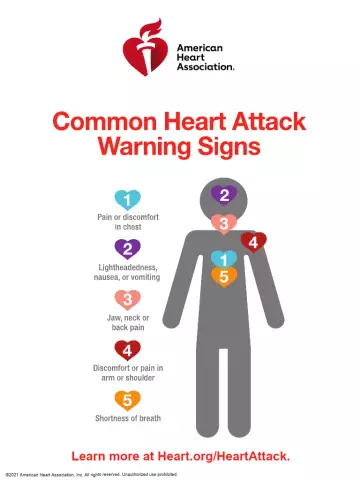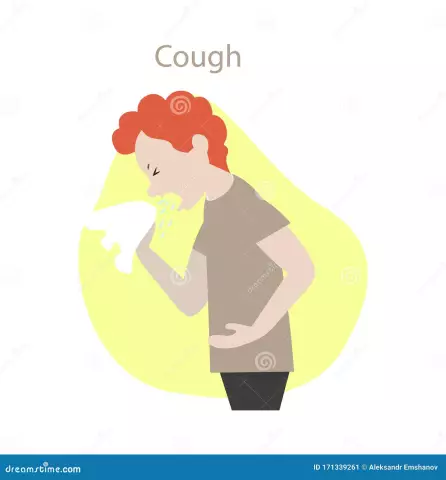- Author Rachel Wainwright wainwright@abchealthonline.com.
- Public 2023-12-15 07:39.
- Last modified 2025-11-02 20:14.
Changeable female mood: hormones attack
What are they, women? Beautiful, gentle, passionate - and windy, impetuous, nervous. And here's what's strange: women possess all these qualities at the same time. Sometimes their mood changes dramatically to the opposite: in the morning they laugh and joke, and in the evening they cry or get irritated.

Source: depositphotos.com
Needless to say, the woman herself does not always understand the reason for the changes that are happening to her, and in such cases a man wants to run away. Meanwhile, the reason is very prosaic: an attack of hormones has begun.
Hormones, not "hormones", as people often mistakenly write. The word "hormone" comes from the Greek "to excite" and to harmony (the ancient Greek "connection, proportion"), respectively, has nothing to do. Perhaps even the opposite: hormones are capable of disrupting any proportionality if there is an imbalance in the body.
Everyone knows that during pregnancy, women freak like never before, and in their lives there is a terrible word "PMS". And hormones are responsible for the oddities that occur with mood during these periods, and not at all an unstable psyche. It is very difficult for men to understand and accept this fact: their hormonal background is not subject to such sharp fluctuations. And that is precisely why the representatives of the stronger sex are stable and reliable.
What are hormones?
These are special chemicals that are produced by the endocrine glands. Moving through the bloodstream, they stimulate specific cells (targets). Thus, hormones are a catalyst for chemical processes in the body. Endocrinology studies hormonal reactions. At the moment, more than 30 hormones are known in medicine, which are produced in different "departments" of the human body:
- the pituitary gland produces a large amount of hormones, including thyroid-stimulating, gonadotropic, luteinizing, melanostimulating, somatotropin (growth hormone), prolactin;
- the hypothalamus produces oxytocin and vasopressin;
- thyroid gland - triiodothyronine, calcitonin;
- pancreas - insulin;
- the adrenal glands produce adrenaline and norepinephrine, cortisol and aldosterone;
- in the gonads, sex hormones are produced - estrogen, estradiol, progesterone, testosterone.
Hormones are responsible for many processes, from growth to human reproductive activity. The fact that a woman is able to conceive and bear a child also depends on her hormonal levels. An interesting fact: male hormones - androgens - are also present in the female body, but in small quantities. Their excess can cause the growth of excess facial and body hair, acne, menstrual irregularities, and in severe cases, infertility.
What is PMS and how to deal with it
PMS is a premenstrual syndrome, to one degree or another it is expressed in every woman. It is generally believed that it manifests itself mainly in mood swings before menstruation, but in fact there can be much more symptoms. These are weight fluctuations, edema, bloating, severe headache, discomfort in the heart area, and even fever. Is it easy to enjoy life with such a bunch of problems?

Source: depositphotos.com
It is believed that the reason for the development of PMS is hormonal imbalance: the wrong ratio of estrogen and progesterone. Curiously, men also experience hormonal disruptions associated with testosterone levels, a condition called male irritability syndrome (CMP). That is, in some situations, drowsiness, fatigue and nervousness in the stronger sex may be associated with this particular problem.
PMS in women occurs every month, and if you do not pay attention to this issue, the condition can worsen over time. We repeat once again - it is unrealistic to fight PMS by means of willpower, it is due to the hormonal background. In severe cases, the doctor may prescribe diuretics, antihypertensive drugs, and even antidepressants to relieve PMS. But you shouldn't be led to that.
The best prevention of PMS is sports and proper nutrition. Sport (physical activity) increases the production of endorphins, a hormone that improves mood, and thus relieves stress. It is better to reduce the consumption of meat and fats in the period before menstruation, giving preference to fish, vegetables and fruits, whole grain bread. Salt can lead to edema because it retains fluid in the body, and sugar increases the excitability of the nervous system. By the way, during PMS, you need to reduce the amount of caffeine, especially not to consume energy drinks that contain it: caffeine increases stress and anxiety. And alcohol disrupts carbohydrate metabolism and can lead to an increase in estrogen levels.
How to tell if your hormones are out of order
If you find yourself often feeling irritable and nervous, lashing out at others for no reason, you should definitely think about the hormonal nature of this phenomenon. If this happens before menstruation, and then all the unpleasant phenomena disappear, you just need to remember about PMS and try to correct its course with the help of diet and physical activity.
However, if mood swings do not depend on the cycle, apathy, a decrease in sex drive are observed, then it makes sense to be examined for the content of not only sex hormones in the blood, but also thyroid hormones - to contact both a gynecologist and an endocrinologist.
Men would like to wish patience - ladies are really unbearable during the period of their hormonal disruptions. But these failures are far from harmless to health, so if necessary, send your beloved to a specialized doctor - only, please, not to a psychiatrist. After all, now you know that hormones control her mood.
YouTube video related to the article:

Maria Kulkes Medical journalist About the author
Education: First Moscow State Medical University named after I. M. Sechenov, specialty "General Medicine".
Found a mistake in the text? Select it and press Ctrl + Enter.






